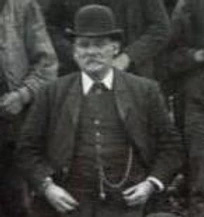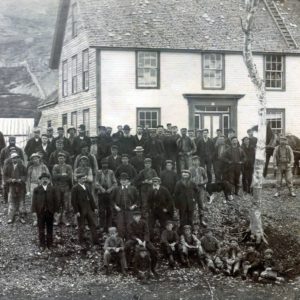 I am going to tell you about Andrew Whyte, Little Bay’s third mine manager. I’d like to put his position in its proper context first so let’s explore the mine manager job itself.
I am going to tell you about Andrew Whyte, Little Bay’s third mine manager. I’d like to put his position in its proper context first so let’s explore the mine manager job itself.
Little Bay was a company town. It had a company store and the miners were paid in company script. This was seen by those in charge as a compassionate form of capitalism. A worker could move to town and there get a job and a home. Their children would get an education and as long as the industry kept running they would eventually get a job and home themselves. The issue was that the quality of life under this system rested on the manager’s quality of character. In practice it was vulnerable to corruption – your boss owns your house and the store you shop at and he pays you with a currency that you can only use at his store. You’re probably familiar with the song that highlighted the problems with this way of life. “You load 16 tons, what do you get? Another day older and deeper in debt. St. Peter, don’t you call me ‘cause I can’t go. I owe my soul to the company store” by Tennessee Ernie Ford.
The mine manager had an awful lot of power but like Uncle Ben says “with great power comes great responsibility” and sometimes a mine manager took that seriously. Andrew Whyte was such a man. One could consider Little Bay’s mine managers through the lens of Plato’s concept of the Philosopher King. Proper leadership is necessary to the functioning of such a paternal system of power.
The mine managers were intelligent men. They often held an advanced education. The value of intelligence and education are felt throughout the town. I’ll reiterate the fact that in late 19th century Little Bay you would hear English, German, French, and even Latin when someone felt like showing off. The Reading Room was supplied with varied periodicals and I have reference to public lectures on everything from human anatomy to Buddhism.
The mine managers were part of the worldwide colonial system of power. When I follow the steamships carrying ore from Little Bay I find them unloading in Wales alongside steamers with goods from India, Africa, and the rest of the colonial world. Researching Little Bay’s mine managers really demonstrates the extent of the colonial system that they propagated and participated in. You can get a sense of this just by considering how much of the world they covered.
As I’ve mentioned elsewhere Little Bay was founded by a German Baron in 1878 but the Baron Ellershausen was a busy man. He was overseeing the whole Northern mining region from his first Newfoundland town – Betts Cove. He also had his fingers in every industry that impacted his region from telegraphy to the railroad. He was allowed the freedom to run his own little fiefdom because he was making Premier William Whiteway a lot of money.
When the Little Bay deposit was discovered it required a lot of infrastructure put in place quickly. In order to get Little Bay off the ground they had to move Betts Cove itself. The oversight of an operation at this scale meant Little Bay needed a manager. The first mine manager as assigned by Baron Ellershausen was his friend and business partner Adolph Guzman. Like the Baron, Guzman was a mining engineer and inventor. The pair had patents related to their inventions. They came to Newfoundland from Nova Scotia and brought loyal German miners with them. Their power extended beyond the town of Little Bay. They had a lot of control over Newfoundland laws through Ellershausen’s relationship with Premier Whiteway. It’s thanks to them that there is still land in Little Bay with Guzman’s name on it. They just made up infinity ownership because they could.
The town is a mixed bag under Guzman. At the start the Germans seem to be highly invested in the community making sure there are schools and theatre and multi-denominational worship. However, they don’t seem to have the same flare for improvement in the time leading up to their departure. I don’t think they’d initially planned to leave but once they did they appear to have lost some interest. The Germans set this paternal system in motion but they didn’t stay long. Their plan to leave was likely the reason the town ended up with a Magistrate which is why Magistrate Blandford is in town by 1881. This divided the power in town between the company manager and the government. I would say the manager still had the stronger say but he no longer needed to oversee such things as policing.
There were still Germans in positions of power in town after Guzman’s departure but the Germans had passed the manager’s torch by 1882. The second mine manager was Edward Clement Wallace. Wallace, like Guzman, was educated as a mining engineer. He was Australian born and was likely handpicked by the Baron as he followed the Germans to Little Bay from Betts Cove. He was not well liked and was publicly blamed for corruption in the media. He was considered responsible for the decline in mining operations for the whole Northern region. He was accused of conspiracy in the town in relation to both communication as well as importation. He put people in power he shouldn’t have and let the working class get scammed out of money in a bunch of ways. He ran Little Bay until he got ran out in 1885. Wallace goes from Little Bay to Zimbabwe where he was injured in the Second Matabele War. This is literally a war between a company and a native population as part of the scramble for Africa. Like I said – colonial.
E.C. Wallace was replaced by Andrew Whyte in 1885. Everyone was super happy about this, like publicly. They really didn’t like Wallace. Unlike the previous managers Andrew Whyte does not appear to have been educated as a mining engineer but he brought a lot of mining experience to the job. He was born in Scotland and worked a coal mine in Leeds with his father from an early age. He must have been smart too. He climbed the ranks from labourer to superintendent. He went from England to Quebec. During this time he published academic work on mining.
The people of Little Bay loved Andrew Whyte. He was described as a “shrewd Scotchman” and saw as a man who got things done. Under Whyte Little Bay prospered. This is where you really see how this company town paternal leadership system thing can work. It requires that the person in charge is competent and motivated by the public good. Under Whyte you see big changes immediately. He sets to work building new homes. He buys a schoolhouse. You can find praise from journalists in regard to the high quality of the town’s appearance and how much money everyone had to spend. The place was booming and the people were comfortable.
Andrew Whyte becomes super involved with the town. He gives public addresses to the Billiard’s Club, the Rifle Club, the Reading Room, etc. He joins the Temperance effort in a big way and it’s while he is in charge that you see their final victory over liquor licensing. He gets a strong ally in E.R. Burgess. Burgess was the president of Little Bay’s Reading Room and would go on to political prominence by representing the region in St. John’s. It’s through this alliance that you start seeing endless petitions sent to St. John’s requesting funding for roads, education, agriculture, etc. As mine manager Whyte is seen as fighting for the people and the town of Little Bay.
The rest of the Whyte family likewise become heavily involved in community life and you can find them listed participating in various clubs and societies. His son James even became the conductor for Little Bay’s Brass Band. They gifted him a pair of binoculars at an event hosted at the Little Bay Hotel while a bunch of fancy people were visiting. James Whyte turned down the position of mine manager for Tilt Cove when it was offered to him but eventually got to be a mine manager like his dad when he accepted the job for Pilley’s Island.
 There’s really nothing bad said about Andrew Whyte’s time in Little Bay but it’s difficult to gauge how much of that was due to his timing. He passed the torch of mine management to his son-in-law, the analytical chemist George Thompson in 1892. This was the same year that the ore quality started to drop which would eventually lead to the pillar robbing I outlined in my cave-in piece. After Andrew Whyte left things started to go to hell. There were other mining operations in Little Bay between the final fire in 1904 and the 1894 shutdown but none hit the high-water mark of Whyte’s years. The town may have started publicly dying in 1894 but its heyday had ended two years earlier, most people just didn’t know it then. I kinda suspect mine manager Andrew Whyte did though and he got out of Dodge. Andrew Whyte set sail for Nova Scotia where he continued to work in mining. He died there in 1912 at the ripe old age of 82. Mine manager Whyte can be remembered as the man who oversaw Little Bay during its most prosperous years and he generally seemed to be an alright guy.
There’s really nothing bad said about Andrew Whyte’s time in Little Bay but it’s difficult to gauge how much of that was due to his timing. He passed the torch of mine management to his son-in-law, the analytical chemist George Thompson in 1892. This was the same year that the ore quality started to drop which would eventually lead to the pillar robbing I outlined in my cave-in piece. After Andrew Whyte left things started to go to hell. There were other mining operations in Little Bay between the final fire in 1904 and the 1894 shutdown but none hit the high-water mark of Whyte’s years. The town may have started publicly dying in 1894 but its heyday had ended two years earlier, most people just didn’t know it then. I kinda suspect mine manager Andrew Whyte did though and he got out of Dodge. Andrew Whyte set sail for Nova Scotia where he continued to work in mining. He died there in 1912 at the ripe old age of 82. Mine manager Whyte can be remembered as the man who oversaw Little Bay during its most prosperous years and he generally seemed to be an alright guy.
That’s it, thanks for reading!

A couple of closing notes. I’m pretty sure Andrew Whyte is the guy in the Payday at the Mine photo that I’ve included. I figure the mine manager would be standing front and centre. I place the time of that photo during the period of either Wallace or Whyte’s leadership based on the presence of both Captain Stewart and the Lind house. Between Wallace and Whyte I’m inclined to believe it’s Whyte based on his age. Wallace was too young.
Andrew Whyte is referenced hundreds of times so I’ve just listed the newspaper names below. If you want a more particular source reference for a citation or something just let me know and I’ll send it to you.
Sources:
- All Quiet – Wells
- Boston Daily Globe
- Daily Colonist
- Evening Telegram
- Harbour Grace Standard
- Lind ledger
- Once Upon a Mine – Martin
- Outing, Vol. 19
- St. John’s Colonist
- Twillingate Sun
